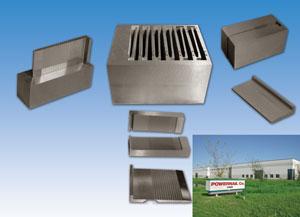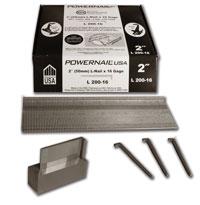- FMA
- The Fabricator
- FABTECH
- Canadian Metalworking
Categories
- Additive Manufacturing
- Aluminum Welding
- Arc Welding
- Assembly and Joining
- Automation and Robotics
- Bending and Forming
- Consumables
- Cutting and Weld Prep
- Electric Vehicles
- En Español
- Finishing
- Hydroforming
- Laser Cutting
- Laser Welding
- Machining
- Manufacturing Software
- Materials Handling
- Metals/Materials
- Oxyfuel Cutting
- Plasma Cutting
- Power Tools
- Punching and Other Holemaking
- Roll Forming
- Safety
- Sawing
- Shearing
- Shop Management
- Testing and Measuring
- Tube and Pipe Fabrication
- Tube and Pipe Production
- Waterjet Cutting
Industry Directory
Webcasts
Podcasts
FAB 40
Advertise
Subscribe
Account Login
Search
Nail stamper seeks tooling tough as nails
Tungsten carbide tooling adds true grit
- April 27, 2012
- Article
- Bending and Forming

Powernail, a manufacturer of hardwood flooring nails, was looking for a way to extend the life of the die sets it used to stamp 1 billion L-cleats and E-cleats annually, because their short lifespans were requiring too many changeouts. (Photo courtesy of Powernail, Zurich, Ill.)
Powernail is a Zurich, Ill.-based manufacturer of hardwood flooring nails, also called “blind” nails (hardware that is invisible after the hardwood flooring has been installed). The company stamps 1 billion of these L-cleats and E-cleats from flat 0.062-inch steel annually. Tom Anstett, owner and president, is the second-generation owner of the company his father and uncle established 65 years ago.
Anstett was looking to improve the lifespan of the high-speed stamping dies his company used to stamp the hardware.
“We had been using the same kind of tooling for almost 10 years, and about a year ago I noticed that our punches and dies were lasting for different lengths of time,” Anstett explained. “Both had relatively short lifespans that were causing us to perform too many changeouts.
“We’re always looking at ways to improve our operating efficiency, and this was one area where I felt we could make a change that would be to our advantage,” he added.
Anstett contacted a number of tooling material manufacturers to help with the problem.
Analyzing Failure
One of the companies Anstett consulted, General Carbide, performed engineering and metallurgical reviews of the application, which indicated that the punches were degrading prematurely because the tooling carbide grade was unable to withstand modern production methods. Specifically, the tungsten grain size was too small to provide the necessary strength, and the material composition contained too much cobalt binder.
Additionally, the punch and die sets had not been treated with additives to minimize corrosion caused by stamping fluids, further intensifying the wear problem.
Both inadequacies thwarted the use of EDM without damaging the tooling. The net result was that Powernail could not take advantage of the quicker machining process to yield better tooling for the company’s high-speed stamping application.
Hitting the Nail on the Head
To remedy the problem, General Carbide developed a plan to use two of its proprietary formulations that have a unique microstructure and antigalling additives—one grade formulation for the die sections, and one grade formulation for the punches. Both are formulated to withstand wire EDM.
These formulations consist of coarse-grain tungsten particles, contain less binder than the material used previously, and have a higher percentage of corrosion-resistant additives. The material composition improves the strength and wear resistance. Tests were conducted to verify that the formulations would allow Powernail to increase tooling life.

Since switching to tungsten carbide tooling (lower left) developed by General Carbide, the company has found that its punch and die sets are lasting four times longer than the old die sets, productivity has increased, and the quality of the hardwood flooring nails has improved. (Photo courtesy of Powernail, Zurich, Ill.)
To confirm with absolute certainty that the tooling material could stamp every grade of steel and stainless steel the company used to stamp its L-cleats and E-cleats, General Carbide and Powernail conducted tests on all the work materials.
“The results have been excellent,” Anstett said.
After seeing the results of the trial runs, Anstett switched to General Carbide’s tungsten carbide tooling.
The high-speed stamping dies that Powernail now uses to manufacture the cleats are made of GC-411 CT. This corrosion-resistant grade of tungsten carbide tooling has high lubricity and resistance to galling in wear areas resulting from its tantalum carbide (TaC) content. Its high toughness and excellent overall wear properties make it a good match for the dies Powernail depends on to stamp its hardwood flooring nails.
Since the change, Powernail’s dies last four times longer than the old ones did, and they are able to produce higher-quality nails. Instead of tooling changes occurring in a matter of hours, they now take place at intervals measured in days.
General Carbide also assisted Anstett with wire EDM machine selection. The unit selected has anti-electrolysis circuitry to minimize surface degradation and susceptibility to rust and corrosion. The recast layer has been dramatically reduced from thousandths of an inch to just a few ten-thousandths of an inch. More than 90 percent of the damage previously occurring during EDM has been eliminated.
Previously Powernail had to grind blanks by hand instead of relying on wire EDM for that function, which took considerable time away from production-related activities. The tungsten carbide blanks the company purchases are finish-ground by the material manufacturer so that Powernail does not have to do it. Anstett estimates that this saves his company 600 hours a year in grinding work.
In addition, Powernail’s new stamping punches and dies have reduced tooling costs by 50 percent because they don’t need to be changed as frequently. Parts are now burr-free, and operators can run multiple presses when necessary.
With manufacturing operations firmly under control, Powernail has been able to explore options for additional automation and concentrate on R&D more extensively than ever.S
subscribe now

The Fabricator is North America's leading magazine for the metal forming and fabricating industry. The magazine delivers the news, technical articles, and case histories that enable fabricators to do their jobs more efficiently. The Fabricator has served the industry since 1970.
start your free subscription- Stay connected from anywhere

Easily access valuable industry resources now with full access to the digital edition of The Fabricator.

Easily access valuable industry resources now with full access to the digital edition of The Welder.

Easily access valuable industry resources now with full access to the digital edition of The Tube and Pipe Journal.
- Podcasting
- Podcast:
- The Fabricator Podcast
- Published:
- 04/16/2024
- Running Time:
- 63:29
In this episode of The Fabricator Podcast, Caleb Chamberlain, co-founder and CEO of OSH Cut, discusses his company’s...
- Trending Articles
AI, machine learning, and the future of metal fabrication

Employee ownership: The best way to ensure engagement

Steel industry reacts to Nucor’s new weekly published HRC price

Dynamic Metal blossoms with each passing year

Metal fabrication management: A guide for new supervisors

- Industry Events
16th Annual Safety Conference
- April 30 - May 1, 2024
- Elgin,
Pipe and Tube Conference
- May 21 - 22, 2024
- Omaha, NE
World-Class Roll Forming Workshop
- June 5 - 6, 2024
- Louisville, KY
Advanced Laser Application Workshop
- June 25 - 27, 2024
- Novi, MI


























